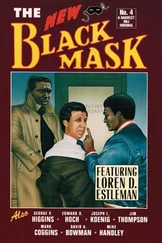The five of us had a camaraderie that made those few hours among the most enjoyable of the week. Every class we would meet to claim the peace that, at Danbury, could only be found within one’s own body. Each session ended with Janet’s final relaxation, when she spoke soothingly to us of the work we had just completed, and the things we had to be grateful for every day, together in prison. And every single week Ghada would fall asleep within minutes during final relaxation, snoring loudly until someone woke her.
ONE EVENING Miss Mahoney, the cheerful education administrator from down the hill, made a lot of people very happy. Miss Mahoney was one of the few prison staffers who seemed to be on our side. As near as I could tell, she was one of the education department’s few saving graces. She did have an annoying habit of trying to be “down on tha mic” when she was on the PA system. On this particular evening she announced that a gender awareness class would be offered in the dining hall. What exactly was going to be conveyed there was unclear.
Then she got to the important matters: “Would the following ladies please report to the CO’s office for their GED test results…” And you could just tell from her voice that the news was good for every name called.
“Malcolm!” Mahoney called.
I jumped out of my bunk. Natalie had taken the GED test approximately a dozen times and was definitely way past due to pass it. She got nervous during the testing, and time and again the math section had proved her bête noir. Where was Natalie?
When I got to the main hall, there were already screams of joy, and women were pouring out of all of the Rooms and Dorms. When a woman of twenty-five, thirty-five, forty-five has struggled to earn her high school diploma in prison, taking pretest after pretest and trying to learn in a poorly run program and classes full of every imaginable delinquent student behavior, and then actually passes, it is a victory. Some of these women had dropped out of school thirty years before and were finally getting one of the only positive things-one of the only measures of achievement-one can earn in prison. Plus, it meant that these women could finally earn above the lowest pay grade at their prison jobs-if you didn’t have your GED, you couldn’t earn over fourteen cents an hour, which was barely enough to pay for toothpaste and soap. Everything came out of our prison accounts-hygiene items, phone calls, fines. If a prisoner didn’t have her GED and didn’t have money coming in from outside, she was screwed. Natalie had toiled for many years as a skilled baker in that prison kitchen, a treasured member of the cooking staff, and yet she could never be paid more than $5.60 a week for forty hours of work.
Where was Miss Natalie? Her name had been called five minutes ago, but I didn’t see her in the throng of jubilant, shouting, laughing women in the hall. Where was my enigmatic bunkie, that supremely self-possessed woman? I knew how badly Natalie wanted that diploma, I suspected it hurt her that she had struggled for so long to pass that math section. With embarrassed dignity, she had declined my offers of study help. This was her moment! Could she possibly be hiding, ashamed to join the orgy of congratulations and illegal hugs taking place in the hallway?
No, wait, she was down at the track! I had watched her putting on her sneakers. In my flip-flops I took off down the hall, out the building, and down the stairs to the track at top speed. She didn’t even know! Halfway down the stairs I was calling out to the others on the track, “Is my bunkie down there?” I rounded the field house-and there she was with her crazy friend Sheila.
“Bunkie! Your GED results are back!” I panted.
Natalie smiled nervously.
“Come up, bunkie, come up and see!”
“Okay, bunkie, I’m coming.” Ladylike to the end, Natalie did not rush.
I started up the stairs as a number of people came down. “Where’s Natalie? Where’s Miss Malcolm? There she is! Come on, Natalie!” My bunkie looked surprised, but she still didn’t hurry. She had that look of skepticism on her face, unwilling to give herself over to celebration until she saw its cause with her own eyes.
When she entered the Camp, an entourage traveling before and behind her, the noise in the hall was deafening, and people were calling out, “Where’s Miss Malcolm?” She was immediately enveloped by people hugging and congratulating her. As she made slow progress up the hall, Natalie laughed and smiled and looked overwhelmed.
Down near the CO’s office, someone was waving her test results in the air. “Natalie, you did it!”
I suddenly thought I was going to lose it and start crying right there, and I was not a crier. The release of so much collective happiness in that miserable place was almost too much for me. It was like hot and cold air colliding, creating a tornado right inside the hall. I took a deep breath, stepped back, and watched my bunkie be enveloped by well-wishers. When I congratulated her in the relative privacy of our cube, she tried to downplay her triumph, but I could tell that she was deeply satisfied.
THE FACT that I’d become used to life in prison shocked my friends and family, but no one on the outside can really appreciate the galvanizing effect of all the regimented rituals, whether official or informal. It’s the insidious, cruel paradox of lengthy sentences: for women doing seven, twelve, twenty years, the only way to survive was to accept prison as their universe. But how on earth would they survive in the outside world when released? “Institutionalized” was one of the greatest insults one could throw at another prisoner, but when you resisted the systems of control, you suffered swift retribution. Where you fit in and how comfortable you were willing to get depended on the length of your sentence, the amount of contact you had with the outside world, and the quality of your life on the outside. And if you resisted finding a place in prison society, you were desperately lonely and miserable.
Mrs. Jones had been in the Camp longer than any other prisoner but would be going home next year. Her cubicle, a Puppy Program single in the corner of A Dorm next to the outside door, was so cozy we all feared what would happen when it came time for her to leave it. “I like this cube. I get all the fresh air I want, plus I can walk the puppies just like that!” she cackled. During the day I liked to drop by Mrs. Jones’s cube to play with Inky, the Labrador retriever she was training as a service dog. I would sit on the floor and rub Inky’s belly while Mrs. Jones fussed around the cube, showing me photographs of women with whom she had done time or her latest crochet project (she specialized in Christmas stockings), and asking me if I wanted random objects she had squirreled away during her fifteen years in prison.
Mrs. Jones spent a lot of time down on the track walking Inky, and she was impressed by my running. She was concerned that she was overweight, so she resolved to start running too. “You and me, we’re going to compete!” she would crow, poking my shoulder hard. “We’ll see what you’re made of!” But Mrs. Jones was perilously top-heavy, and after wheezing her way around only one lap, she sat on a bench, heaving for breath. I suggested she try speedwalking instead. This she found manageable and would huff and puff around all morning at top speed, obsessively.
One day Mrs. Jones came to see me in my cube. I was writing letters up in my bunk. She peeked around the particleboard like a little girl, which I found disconcerting. “What’s up, Mrs. Jones?”
“Are ya busy?”
“Not too busy for you, OG. Come on in.”
She came closer to the bunk bed and whispered conspiratorially, “I got a favor to ask ya.”
Читать дальше












